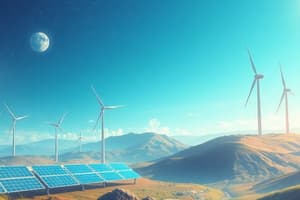Podcast
Questions and Answers
What are the five main types of Renewable Energy?
What are the five main types of Renewable Energy?
Solar Energy, Wind Energy, Hydropower, Biomass, and Geothermal.
What is a key benefit of using Renewable Energy?
What is a key benefit of using Renewable Energy?
It reduces greenhouse gas emissions.
What distinguishes residential real estate from commercial real estate?
What distinguishes residential real estate from commercial real estate?
Residential real estate includes homes and apartments, while commercial real estate consists of office buildings and shopping centers.
What is the meaning of 'market value' in real estate?
What is the meaning of 'market value' in real estate?
How does the rise of remote work impact the real estate market?
How does the rise of remote work impact the real estate market?
Flashcards are hidden until you start studying
Study Notes
Overview of "RE"
- Definition: "RE" can refer to various concepts depending on the context, including Renewable Energy, Real Estate, and more. Clarification on context is necessary for specificity.
Renewable Energy (RE)
-
Definition: Energy generated from natural processes that are continuously replenished.
-
Types:
- Solar Energy: Captured from sunlight using photovoltaic cells.
- Wind Energy: Produced from wind using turbines.
- Hydropower: Generated from the energy of flowing water.
- Biomass: Derived from organic material, such as plant and animal waste.
- Geothermal: Energy generated from the heat stored beneath the Earth's surface.
-
Benefits:
- Reduces greenhouse gas emissions.
- Decreases reliance on fossil fuels.
- Enhances energy security.
- Creates jobs in new energy sectors.
-
Challenges:
- Initial capital costs can be high.
- Intermittency of sources (e.g., solar and wind depend on weather conditions).
- Land use and environmental impacts.
Real Estate (RE)
-
Definition: Property consisting of land and the buildings on it, along with natural resources.
-
Types:
- Residential: Homes and apartments.
- Commercial: Office buildings, shopping centers, and hotels.
- Industrial: Factories and warehouses.
- Land: Undeveloped property.
-
Key Concepts:
- Market Value: The price at which property would sell in a competitive market.
- Investment: Real estate as a vehicle for generating income through renting or capital appreciation.
- Financing: Mortgages and loans as common methods to purchase property.
-
Trends:
- Rise of remote work impacting residential markets.
- Increased investment in sustainable and energy-efficient buildings.
Other Contexts of "RE"
- Regex (Regular Expressions): A sequence of characters that form a search pattern, commonly used for string matching in programming.
- Religious Education (RE): The teaching of a particular religion and its beliefs, values, and practices in an educational setting.
Conclusion
The term "RE" encompasses multiple domains, each with unique characteristics and implications. Understanding the context is essential for applying the relevant concepts effectively.
Renewable Energy (RE)
- Energy derived from natural resources that replenish themselves continuously.
- Examples include solar, wind, hydropower, biomass, and geothermal energy.
- Offers benefits such as reducing greenhouse gas emissions, lowering reliance on fossil fuels, enhancing energy security, and creating jobs.
- Faces challenges like high initial costs, intermittency of sources, and land use and environmental concerns.
Real Estate (RE)
- Encompasses land, buildings, and natural resources.
- Includes residential, commercial, industrial, and undeveloped (land) properties.
- Key concepts include market value, investment (generating income), financing (mortgages and loans).
- Current trends highlight a rise of remote work impacting residential markets and increased investment in sustainable and energy-efficient buildings.
Regex (Regular Expressions)
- Represents a sequence of characters forming a search pattern used for string matching in programming.
Religious Education (RE)
- Focuses on the teaching of a specific religion within an educational setting.
- Covers beliefs, values, and practices of the religion in question.
Studying That Suits You
Use AI to generate personalized quizzes and flashcards to suit your learning preferences.




